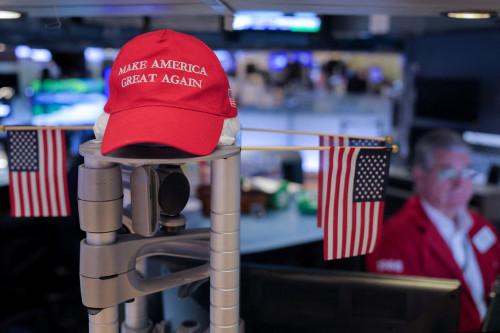By Lewis Krauskopf
NEW YORK (Reuters) -Wild swings in global markets are poised to keep U.S. stock investors on edge in the coming week, as a weakening dollar and a selloff in Treasuries compound extreme equity volatility that erupted after President Donald Trump launched his sweeping tariffs.
The S&P 500 was set for solid gains on the week after Trump pulled back on the heftiest tariffs on many countries, relieving Wall Street’s worst-case scenario. Still, the benchmark index still was down about 13% from its February 19 all-time closing high. Concerns about lasting economic damage remained as the U.S. and China ratcheted up their trade battle and questions lingered over levies elsewhere as Trump only paused many of the most severe tariffs.
Investors punished U.S. assets in the wake of Trump’s tariffs, with the dollar plunging against other major currencies and benchmark U.S. Treasury yields, which move opposite to bond prices, surging.
The stock market is “very unsettled” as investors weigh how to price in any economic fallout from the changing tariff backdrop, said Mark Luschini, chief investment strategist at Janney Montgomery Scott.
The market is “kind of trapped by the level of uncertainty that lurks out there,” Luschini said. “And therefore investors are largely unwilling to make big bets in one direction or another.”
A volatile week in stocks was highlighted by Wednesday’s 9.5% jump for the S&P 500, the index’s biggest one-day rise since October 2008 during the heart of the financial crisis.
The Cboe Volatility index, an options-based measure of investor anxiety, stood at around 40, more than twice its historic median level.
Stock investors were warily watching moves across asset classes, in particular the dollar and Treasuries. An index that measures the dollar against a basket of currencies on Friday fell below 100 for the first time in nearly two years, while the yield on the benchmark 10-year Treasury was on pace for its biggest weekly jump in decades.
In many prior risk-off events, the dollar and Treasuries have acted as safe havens, but that has not been the case over the last week as stocks have tumbled, said Walter Todd, chief investment officer at Greenwood Capital in South Carolina.
“We are the reserve currency and the risk free asset of the world, and our markets are not acting as such,” Todd said.
The yield on the 10-year Treasury on Friday topped 4.5%, which investors have cited as a level that could cause turbulence for stocks. Higher yields translate into higher borrowing costs for consumers and businesses, while potentially making bonds more competitive investments against stocks.
“Until Treasuries stabilize and start to behave normally, risk assets will struggle,” Barclays analysts said in a note on Friday.
Quarterly U.S. corporate results in the coming week provide another test for investors. Goldman Sachs, Johnson & Johnson and Netflix are among the major U.S. companies set to report.
Bryant VanCronkhite, senior portfolio manager at Allspring Global Investments, said he would be looking for companies which can show confidence in their businesses despite the shifting tariff landscape.
“I’m looking for companies that have the competence and the desire to invest through this cycle,” VanCronkhite said.
Data on U.S. retail sales for March will shed light on the health of the consumer, but investors may discount the report to some extent because it covers a period before Trump’s April 2 tariff announcement. A survey on Friday showed U.S. consumer sentiment fell sharply in April and 12-month inflation expectations surged to the highest level since 1981 amid unease over escalating trade tensions.
Markets will remain highly sensitive to developments on the trade front. Investors will hope for evidence of progress between the U.S. and countries for which Trump has paused hefty levies for 90 days.
The faceoff between the U.S. and China — the world’s two largest economies — will also consume attention. Beijing increased its tariffs on U.S. imports to 125% on Friday after Trump’s move to hike duties on Chinese goods.
“China negotiations remain key for markets,” Citi strategists said in a note.
(Reporting by Lewis Krauskopf; Editing by David Gregorio)


